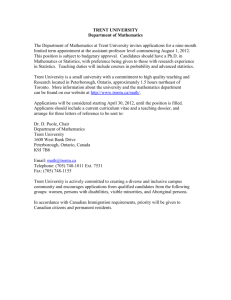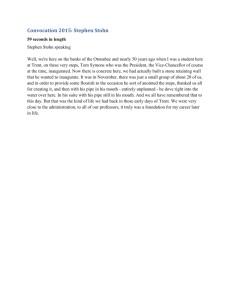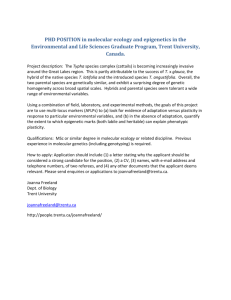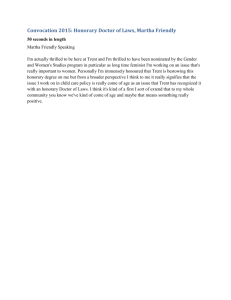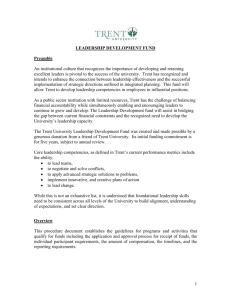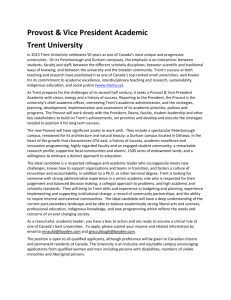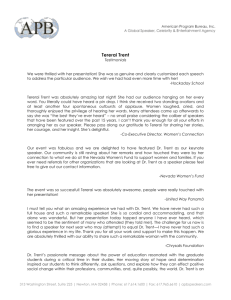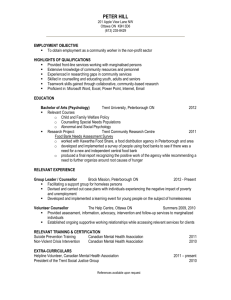CUST 3532H Fall 2014 - Alan O'Connor
advertisement
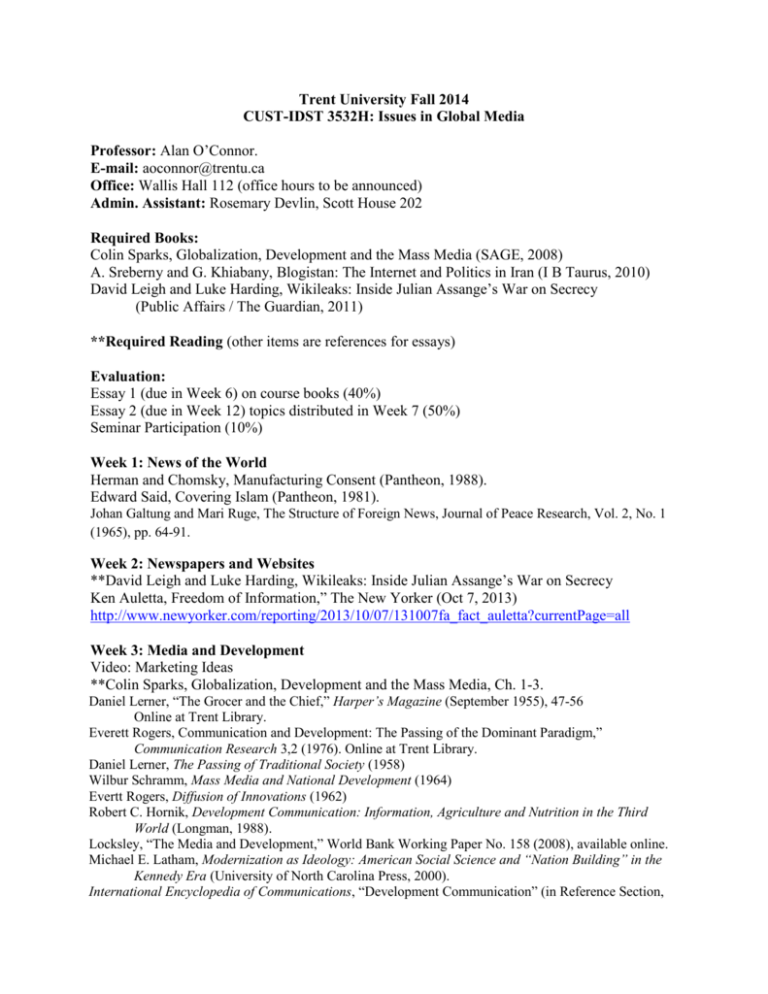
Trent University Fall 2014 CUST-IDST 3532H: Issues in Global Media Professor: Alan O’Connor. E-mail: aoconnor@trentu.ca Office: Wallis Hall 112 (office hours to be announced) Admin. Assistant: Rosemary Devlin, Scott House 202 Required Books: Colin Sparks, Globalization, Development and the Mass Media (SAGE, 2008) A. Sreberny and G. Khiabany, Blogistan: The Internet and Politics in Iran (I B Taurus, 2010) David Leigh and Luke Harding, Wikileaks: Inside Julian Assange’s War on Secrecy (Public Affairs / The Guardian, 2011) **Required Reading (other items are references for essays) Evaluation: Essay 1 (due in Week 6) on course books (40%) Essay 2 (due in Week 12) topics distributed in Week 7 (50%) Seminar Participation (10%) Week 1: News of the World Herman and Chomsky, Manufacturing Consent (Pantheon, 1988). Edward Said, Covering Islam (Pantheon, 1981). Johan Galtung and Mari Ruge, The Structure of Foreign News, Journal of Peace Research, Vol. 2, No. 1 (1965), pp. 64-91. Week 2: Newspapers and Websites **David Leigh and Luke Harding, Wikileaks: Inside Julian Assange’s War on Secrecy Ken Auletta, Freedom of Information,” The New Yorker (Oct 7, 2013) http://www.newyorker.com/reporting/2013/10/07/131007fa_fact_auletta?currentPage=all Week 3: Media and Development Video: Marketing Ideas **Colin Sparks, Globalization, Development and the Mass Media, Ch. 1-3. Daniel Lerner, “The Grocer and the Chief,” Harper’s Magazine (September 1955), 47-56 Online at Trent Library. Everett Rogers, Communication and Development: The Passing of the Dominant Paradigm,” Communication Research 3,2 (1976). Online at Trent Library. Daniel Lerner, The Passing of Traditional Society (1958) Wilbur Schramm, Mass Media and National Development (1964) Evertt Rogers, Diffusion of Innovations (1962) Robert C. Hornik, Development Communication: Information, Agriculture and Nutrition in the Third World (Longman, 1988). Locksley, “The Media and Development,” World Bank Working Paper No. 158 (2008), available online. Michael E. Latham, Modernization as Ideology: American Social Science and “Nation Building” in the Kennedy Era (University of North Carolina Press, 2000). International Encyclopedia of Communications, “Development Communication” (in Reference Section, Trent Library) Week 4: Participatory Media Video: The Voice of the Mines **Colin Sparks, Globalization, Development and the Mass Media, Ch. 4 Guy Bessette, Involving the Community: A Guide to Participatory Development Communication. Online at http://www.idrc.ca/en/ev-52226-201-1-DO_TOPIC.html Rodriguez and El Gazi, “The Poetics of Indigenous Radio in Colombia,” Media, Culture and Society 2007, 29(3), 449-468. Online at Trent Library. Alan O’Connor, “The Bolivian Miners Radio Stations,” Journal of Communication (1990). Alan O’Connor ed., Community Radio in Bolivia: The Miners’ Radio Stations (Mellen, 2004). Paper Tiger Television: Luis R Beltran Tunes into Bolivian Miners Radio, watch at: http://www.cctv.org/watch-tv/programs/luis-r-beltran-tunes-bolivian-miners-radio-call-it-whatit-domestic-violence-and-m Week 5: Inequality in Global Media (NWICO debates) Colin Sparks, Globalization, Development and the Mass Media **Colleen Roach, “The Movement for a New World and Communication Order,” Media, Culture and Society vol. 12, no. 3 (1990). Online at Trent Library. Neil, “Assessing the effectiveness of UNESCO’s new convention on cultural diversity,” Global Media and Communication (2006): 257-262. Sean MacBride, Many Voices, One World (Unesco, 1980). Two copies in Trent Library and online at http://unesdoc.unesco.org/images/0004/000400/040066eb.pdf William Preston, Hope & Folly: The United States and UNESCO (Minnesota, 1989). Week 6: Global Media Industries Today **Colin Sparks, Globalization, Development and the Mass Media (SAGE, 2007), Ch. 6. Arsenault and Castells, “The structure and dynamics of global multi-media business networks,” International Journal of Communication 2 (2008): 707-48. Free online journal. http://ijoc.org/index.php/ijoc/article/view/298/188 Manuel Castells, Communication Power (Oxford, 2009). W. Lance Bennett, “Global Media and Politics” Annual Review of Political Science vol. 7(2004):125-48. Week 7: The Global Digital Divide **Robin Mansell, “From Digital Divides to Digital Entitlements in Knowledge Societies,” Current Sociology 50,3 (2002). Online at Trent Library. Hargittai and Walejko, “The Participation Divide,” Information, Communication and Society 11,2 (2008): 239-256. Zillien and Hargittai, “Digital Distinction,” Social Science Quarterly vol. 90, no. 2 (2009). Mark Warschauer, “Demystifying the Digital Divide,” Scientific American (August 2003). Jan A.G.M. van Dijk, The Deepening Divide (SAGE, 2005) Jan A.G.M. van Dijk, The Digital Divide as a Complex and Dynamic Phenomenon,” Information Society 19 (2003): 315-326. Wilson, The Information Revolution and Developing Countries (MIT 2004), Ch. 6. Manuel Castells, The Internet Galaxy (Oxford, 2001), Chs. 8 - 9. Pippa Norris, Digitial Divide (Cambridge, 2001), Chs. 3 - 4. Week 8: Issues of Internet Governance **Palfrey, “Four Phrases of Internet Regulation” (Harvard Law School) free online from Social Science Research Network http://papers.ssrn.com/sol3/papers.cfm?abstract_id=1658191 Wilson, “What is Internet Governance?” Journal of Public Policy 25 (2005): 29-50. Milton Mueller, Ruling the Root: Internet Governance and the Taming of Cyberspace (2001). Milton Mueller, Networks and States: The Global Politics of Internet Governance (MIT Press, 2010). Robert Deibert and others, Access Contested (MIT Press, 2012) also available free online http://www.idrc.ca/EN/Resources/Publications/Pages/IDRCBookDetails.aspx?PublicationID=998 Jack Goldsmith and Tim Wu, Who Controls the Internet? Illusions of a Borderless World (Oxford University Press, 2006). Luke Harding, The Snowden Files (Guardian Books, 2014) Week 9: Google and the Politics of Search Engines **Matthew Zook and Mark Graham, “The Creative Construction of the Internet: Google and the privatization of cyberspace and DigiPlace,” Geoforum 38 (2007): 1322-1343. Elad Segev and N. Ahituv, Popular searches in Google and Yahoo!: A "digital divide" in the information uses? The Information Society, 26 (2010): 17-37. Elad Segev, “The Imagined International Community: Dominant American Priorities and Agendas in Google News,” Global Media Journal, Fall 2008 (free online journal). Ken Auletta, Googled: The End of the World as We Know It (New York: Penguin, 2009) Ken Auletta, “The Search Party,” The New Yorker, 14 Jan 2008 (available online). Jean-Noël Jeanneney, Google and the Myth of Universal Knowledge (Chicago, 2007). Amnesty International, “Undermining Freedom of Expression in China: The Role of Yahoo, Microsoft and Google” (2006) online at amnesty.org/library Week 10: Are Blogs Effective? ** Sreberny and Khiabany, Blogistan: The Internet and Politics in Iran Negar Azimi, “Bloggers Against Torture” The Nation, Feb 6, 2007 (online) Etling et al, “Mapping the Arabic blogosphere: politics and dissent online,” New Media and Society 12, 8 (2010): 1225-1243. Xiang Zhou, “The Political Blogosphere in China,” New Media and Society 11, 6 (2009): 1003-22. Wang and Hong, “Discourse behind the forbidden realm: Internet surveillance and its implications on China’s blogosphere,” Telematics and Informatics 27 (2010): 67-78. Week 11: Mobile Phones and Development **Horst and Miller, “From Kinship to Link-Up: Cell Phones and Social Networking in Jamaica”, Current Anthropology 46, 5 (Dec 2005): 755-78. Horst and Miller, The Cell Phone: An Anthropology of Communication (Berg, 2006) Don Slater and Janet Kwami. “Embeddedness and escape: Internet and mobile use as poverty reduction strategies in Ghana.” June 2005. Online http://zunia.org/uploads/media/knowledge/internet.pdf [accessed Jan 2010] Manuel Castells, Mobile Communication and Society: A Global Perspective (MIT Press, 2007). Jack Linchuan Qui, Working Class Network Society (MIT, 2009) Qiu and Liuning, “Through the Prism of the Internet Café,” China Information (2005) XIX: 261-297. Jack Linchuan Qiu, “The Accidental Accomplishment of Little Smart,” New Media and Society (2007): 903-923. Sahar Khamis, “New Media and Social Change in Rural Egypt: Transformations, Paradoxes and Challenges” Arab Media & Society 11 (Winter 2010) free online journal Debates on microcredit: Nicholas P. Sullivan, You Can Hear Me Now: How Microloans and Cell Phones are Connecting the World’s Poor to the Global Economy (John Wiley, 2007). Lamia Karim, Microfinance and Its Discontents: Women and Debt in Bangladesh (Minnesota, 2011). See also blog: http://cswswomensrights.wordpress.com/2011/03/31/the-rise-and-fall-of-the-godfather-ofmicrofinance-muhammad-yunus-and-the-grameen-bank/ Bateman, Why Doesn’t Microfinance Work? (Zed Books, 2010), in Trent Library. Video Collection (online) video clips on micro-credit. Week 12: Uses of the Internet Telecentres Lincos (website) http://www.lincos.net MIT site (website) http://www.media.mit.edu/unwired/center.html MIT slideshow (website) http://dn.media.mit.edu/lincos.ppt Wikipedia Reagle, Good Faith Collaboration: The Culture of Wikipedia (2010). http://reagle.org/joseph/2010/gfc/ http://en.wikipedia.org/wiki/Wikipedia:Neutral_point_of_view http://en.wikipedia.org/wiki/Wikipedia:Assume_good_faith Participatory Research Geert Lovink, Zero Comments (Routledge 2008). Chapter on revisiting Sarai (India). (website) http://networkcultures.org/wpmu/portal Sarai (website) http://www.sarai.net Sarai (website) comic book on free open source software http://www.sarai.net/publications/occasional/floss-is-not-just-good-for-teeth SARAI (India) Mass media and city life (online) Learning Outcomes: By the end of the course a successful student should: 1. Have a good understanding of issues of global media, or media and development 2. Understand that there are different perspectives on these issues 3. Be able to apply these perspectives to current issues and problems 4. Have written specialized essays in this area of knowledge and research 5. Understand that we are dealing with real world issues and there are limits to knowledge 6. Be able to make judgments on complex issues in an independent and professional manner. Access to Instruction It is Trent University’s intent to create an inclusive learning environment. If a student has a disability and/or health consideration and feels that he/she may need accommodations to succeed in this course, the student should contact the Student Accessibility Services Office (SAS), (BH Suite 132, 748-1281, accessibilityservices@trentu.ca). For Trent University in Oshawa Student Accessibility Services Office contact 905-435-5102 ext. 5024. Complete text can be found under Access to Instruction in the Academic Calendar. Academic Integrity Academic dishonesty, which includes plagiarism and cheating, is an extremely serious academic offence and carries penalties varying from a 0 grade on an assignment to expulsion from the University. Definitions, penalties, and procedures for dealing with plagiarism and cheating are set out in Trent University’s Academic Integrity Policy. You have a responsibility to educate yourself – unfamiliarity with the policy is not an excuse. You are strongly encouraged to visit Trent’s Academic Integrity website to learn more – www.trentu.ca/academicintegrity.
